
Acclaimed historian Greg Grandin joins Democracy Now! to discuss the Trump administration’s attack on an alleged drug-smuggling boat in international waters, which killed 11 people earlier this week. President Trump and other senior officials have claimed without evidence that the boat was carrying narcotics from Venezuela to the United States and was operated by the gang Tren de Aragua, which the U.S. has designated a terrorist organization. “It was pure murder,” says Grandin. “In many ways, it’s bringing the logic of Gaza into the Caribbean, in terms of unaccountability, impunity and an expansive notion of national defense to justify what is, in effect, just extrajudicial killing.”
Transcript
AMY GOODMAN: This is Democracy Now!, democracynow.org. I’m Amy Goodman.
As President Trump is set to sign an executive order to rename the Department of Defense the Department of War, his administration is threatening to carry out more military attacks in Latin America under the guise of the “war on drugs,” after the U.S. blew up a boat off the coast of Venezuela.
PRESIDENT DONALD TRUMP: You see it. You see the bags of drugs all over the boat. And they were hit. Obviously, they won’t be doing it again. And I think a lot of other people won’t be doing it again when they watch that tape.
AMY GOODMAN: The U.S. has deployed several ships, even a nuclear-powered submarine, in the southern Caribbean. On Thursday, U.S. officials said two Venezuelan military aircraft buzzed a U.S. Navy ship in international waters.
This comes as senior Trump administration officials are refusing to provide proof of their claims that blowing up the boat in the Caribbean earlier this week because it was carrying drugs from Venezuela. Defense Secretary Pete Hegseth said he watched a live video feed of the operation, that the vessel targeted by the Pentagon was operated by the Tren de Aragua gang. But Hegseth provided no evidence. Venezuela’s communication minister claimed the video was a fake made with artificial intelligence.
In a New York Times report Thursday, an anonymous former senior federal law enforcement official said the attack was a significant change in U.S. anti-narcotics operations and that, quote, “it was more likely that the vessel was carrying migrants on a human smuggling run.” The official noted, quote, “It would be impossible to know for sure, however, given that any evidence of drug smuggling was destroyed in the attack,” unquote. Many experts believe the strike was illegal under both international law and domestic law.
The attack came as Secretary of State Marco Rubio left for a trip to Latin America, where reporters asked if the Trump administration would seek congressional approval in the future for such strikes, but he didn’t respond.
Meanwhile, President Nicolás Maduro announced he had mobilized over 8 million people into the National Bolivarian Militia to defend Venezuela against U.S. aggression. The U.S. recently doubled the reward for Maduro’s arrest to $50 million and also accused him of being the head of the Cártel de los Soles.
Rubio was in Ecuador Thursday, after going to Mexico. He designated two more Latin American cartels as foreign terrorist organizations.
For more, we’re joined by Greg Grandin, history professor at Yale University, Pulitzer Prize-winning author. His new book is America, América: A New History of the New World.
So, you have this boat filled with people, 11 people. Talk about what that indicates and what it means that the U.S. just blew it up in international waters.
GREG GRANDIN: Well, it was pure murder, and it was pure premeditated murder. It was 11 people in a go-fast boat. If you have that kind of boat, you’re not — and you’re using it for drugs, you’re not going to waste space with filling it with 11 people and laying it down with 11 people. You’re going to want to use that space to carry the drugs.
And it was premeditated because, I mean, 11 people were summarily executed, you know, and it’s unclear where. There’s no information, no intelligence, somewhere in the southern Caribbean, somewhere near Venezuela. And it seems like this has been something that’s been planned for quite a while. When Trump came into office, he declared — he issued a number of his executive orders that declared cartels to be terrorist organizations and subject to military retaliation. On August 9th, The New York Times reported that he signed a secret order allowing the U.S. to use lethal action against criminal — criminals within Latin America.
And this seemed like, you know, a very staged — a very staged event that was, you know, basically a serial killer looking for a victim. And when this boat left, when they caught this boat, I guess, on satellite, they gave the execution order. And no bodies have been found. I mean, really, in many ways, it’s bringing the logic of Gaza into the Caribbean, in terms of unaccountability, impunity and an expansive notion of national defense to justify what is, in effect, just extrajudicial killing.
AMY GOODMAN: And you have Marco Rubio, who is in Mexico, I believe, meeting with Claudia Sheinbaum, saying, “We’re going to do it again and again.”
GREG GRANDIN: Yeah, it’ll happen again, he said.
AMY GOODMAN: Who are the countries they’re threatening? And who are they saying they will not attack?
GREG GRANDIN: Well, it’s mostly Venezuelan. What’s interesting about this is that it comes at a very interesting moment, because there is a rift within the Trump administration between those who want to do business with Venezuela. Chevron just received a license to pump oil and sell it in the U.S., and that production just started a few weeks ago, and the first shipments of oil from Venezuela, you know, and variants on the sanctions placed on Venezuela have just gone through.
But, of course, Marco Rubio has opposed this for quite a while. Marco Rubio is leading the hard-liners, who basically want to use Latin America and go hard against Cuba, against Venezuela. He’s been obsessed about Venezuela. Certainly, during the first term as a senator, he exerted enormous influence on the Trump administration, that led to the fiasco of Trump’s foreign policy in Venezuela during his first term. And now he seems to be doing it again. He was in Ecuador. Ecuador is actually a country that does export quite a bit of drugs, more than Venezuela, into the Pacific.
And it’s a militarization of the drug war. And what’s interesting about this is that most of Latin America’s political class, including centrists and conservatives, former presidents, like Ernesto — like Cardoso in Brazil and Zedillo in Mexico, want the drug war wound down. And the United States is escalating it and folding it into the “war on terror.”
AMY GOODMAN: I was just reading the front page of The New York Times, “Without Arrest or Trial, Killing Drug Suspects,” pointing out what happens when you go after alleged drug suspects, going back to 2001, Peru, CIA identifying for Peru a plane, saying it was carrying drug smugglers. In fact, it was carrying American missionaries, killed.
GREG GRANDIN: Yeah, yeah.
AMY GOODMAN: And then you have Duterte, President Trump praising Duterte, the former —
GREG GRANDIN: From the Philippines, yeah.
AMY GOODMAN: — the former president, the father of — the former president of Philippines. Now he is sitting in The Hague, and he is wanted for crimes against humanity.
GREG GRANDIN: Yeah, well, in many ways, Trump — this is exceptional. Without a doubt, this is an escalation, an amplification of the United States’s right to kill who it wants, when it wants, where it wants. But it is a long line. There is a long history of this. It started — in the post-Cold War period, the U.S. escalated and claimed greater right for self-defense, expanded what they understood to be the notion of self-defense. When Reagan bombed Libya in 1986, it was in — he invoked Article 51 of the U.N. Charter, saying the United States was acting in self-defense because Libya was involved in a bombing of a Berlin disco in which a U.S. Marine was killed. Then you had, of course, the invasion of Panama, which was in 1991, which in many ways kind of echoes — placing a bounty on Maduro’s head is just treating him a lot like they treated Noriega.
AMY GOODMAN: And what about — you’re talking about this division within the Trump White House — the role of oil companies like ExxonMobil and Chevron?
GREG GRANDIN: Yeah, well, you know, in many ways, it’s a throwback to the 1930s, when Royal Dutch Shell supported Paraguay, and Standard Oil supported Bolivia, and it led to the Chaco War. Today, we have Exxon backing Guyana, British — formerly British Guyana, and Chevron backing backing Venezuela, and there’s a border dispute.
Venezuela, of course, has one of the largest deposits of crude oil in the world, something like an estimated 300 billion barrels of oil. And a lot of that spills out into what is Guyana, untapped area in Guyana. Exxon is operating in Guyana, supporting the Guyanese government, and Chevron is operating in Venezuela. So you’re seeing the kind of geopolitical tension between these two oil giants playing out, you know, in the Caribbean, in the southern Caribbean, and U.S. foreign policy kind of folding into it and escalating the conflict.
AMY GOODMAN: Let’s end with Venezuelan President Nicolás Maduro speaking during a news conference this week.
PRESIDENT NICOLÁS MADURO: [translated] Eight military ships, with 1,200 missiles, and a nuclear submarine are targeting Venezuela. This is an extravagant, unjustifiable, immoral and absolutely criminal bloody threat. They have wanted to escalate what they call maximum pressure, which in this case is military. And in response to maximum military pressure, we’ve declared maximum preparedness for the defense of Venezuela.
AMY GOODMAN: Your final comments, Greg Grandin?
GREG GRANDIN: Well, it really is brinkmanship. I mean, Marco Rubio is really pushing the envelope here. I mean, this morning, we heard that Maduro sent a gaggle of jets to buzz over a U.S. ship. I mean, this is —
AMY GOODMAN: In international orders.
GREG GRANDIN: Yeah, in international waters. I mean, this really could spill out of control in all sorts of ways. And, of course, Rubio’s goal is to basically tank the Chevron deal, ultimately, and topple Maduro, and then — and then Cuba.
AMY GOODMAN: Interesting that President Trump is signing the executive order today renaming the Pentagon the Department of War.
GREG GRANDIN: Yeah, I know.
AMY GOODMAN: Greg Grandin, Yale University history professor, Pulitzer Prize-winning author. His latest book, America, América: A New History of the New World.
When we come back, we go to Jakarta to look at the crackdown on mass protests. Stay with us.
[break]
AMY GOODMAN: Malian musician Khaira Arby, performing in Democracy Now!’s studios.

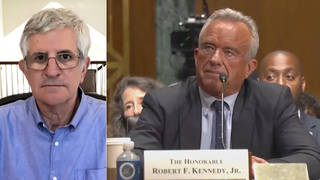
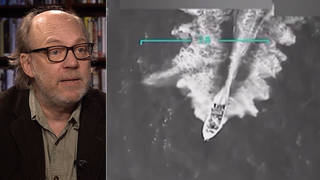
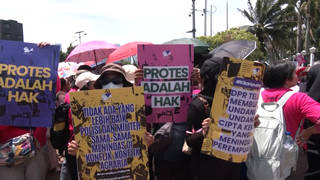
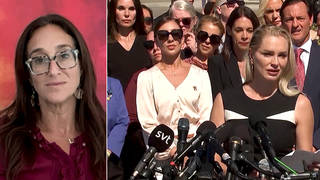





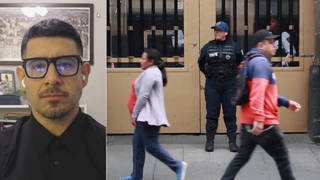
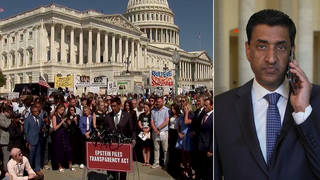
Media Options